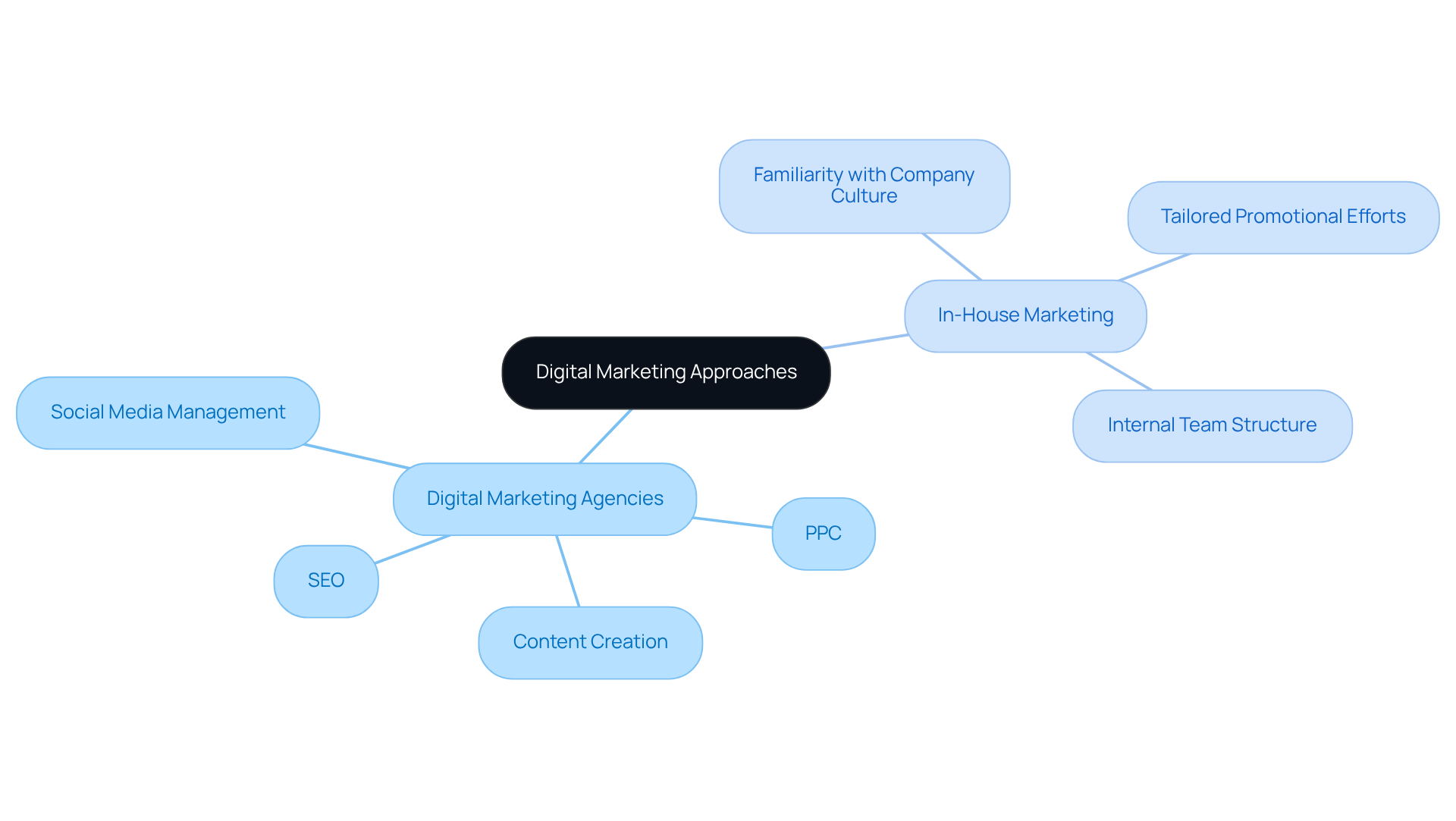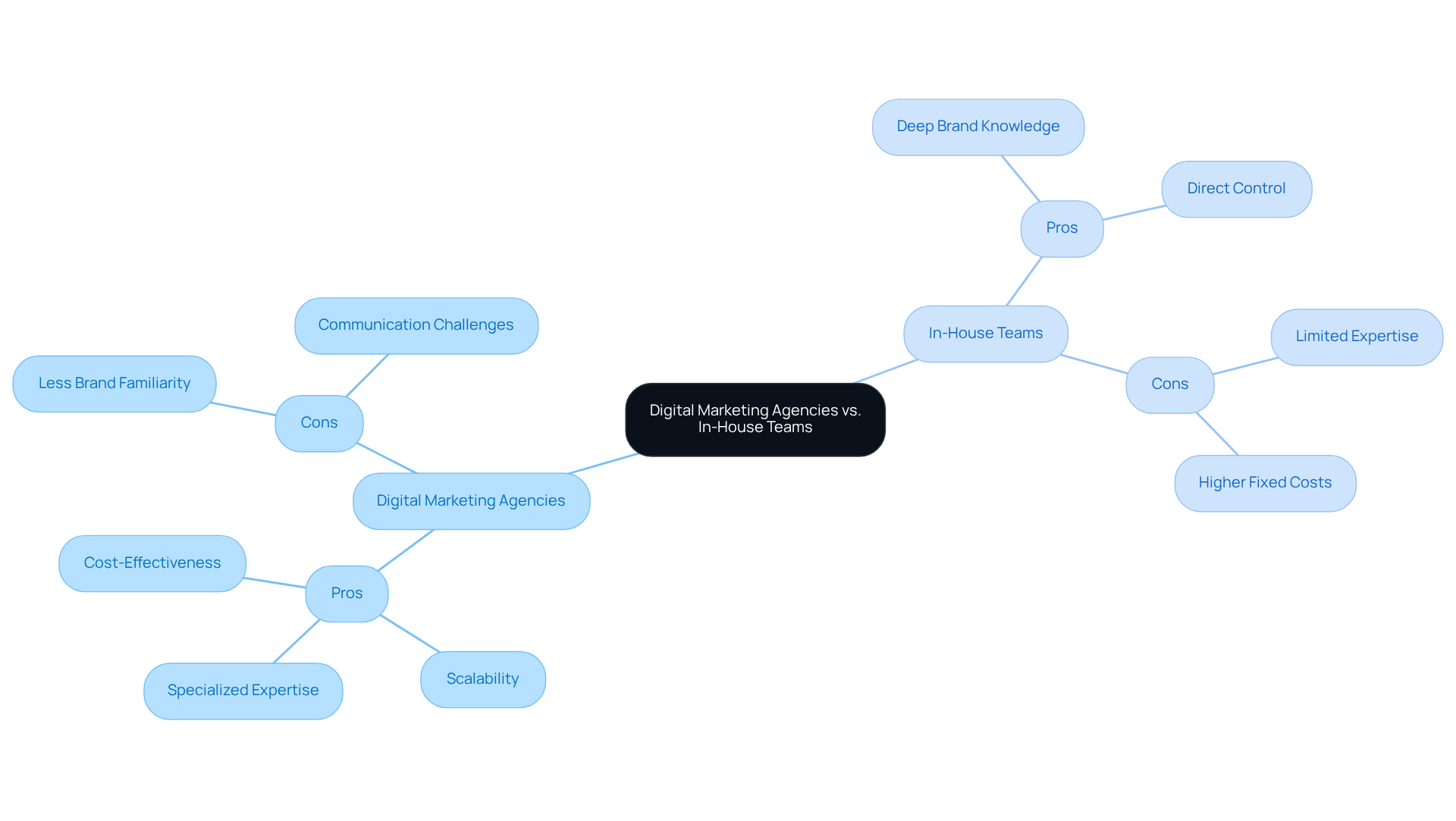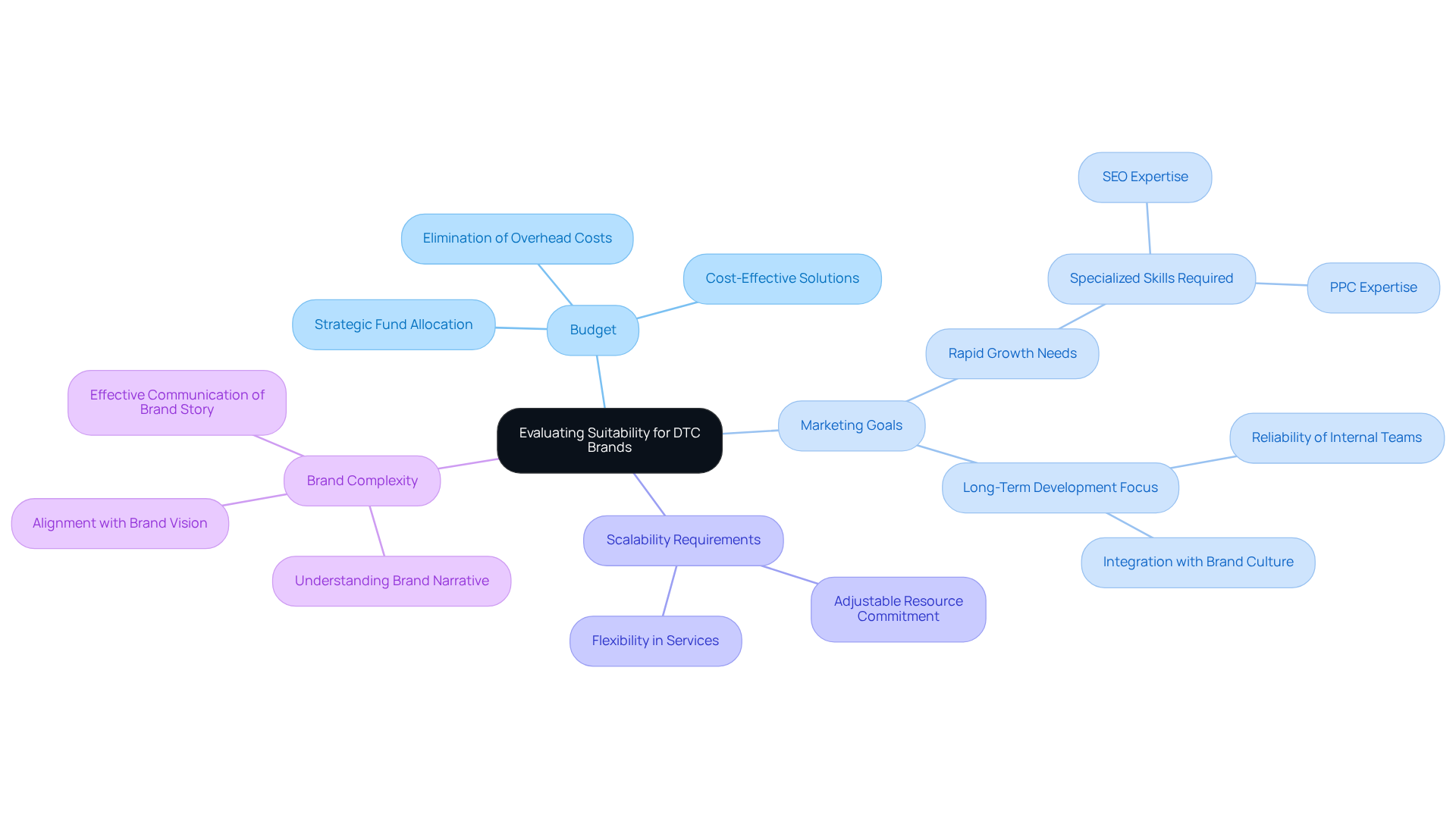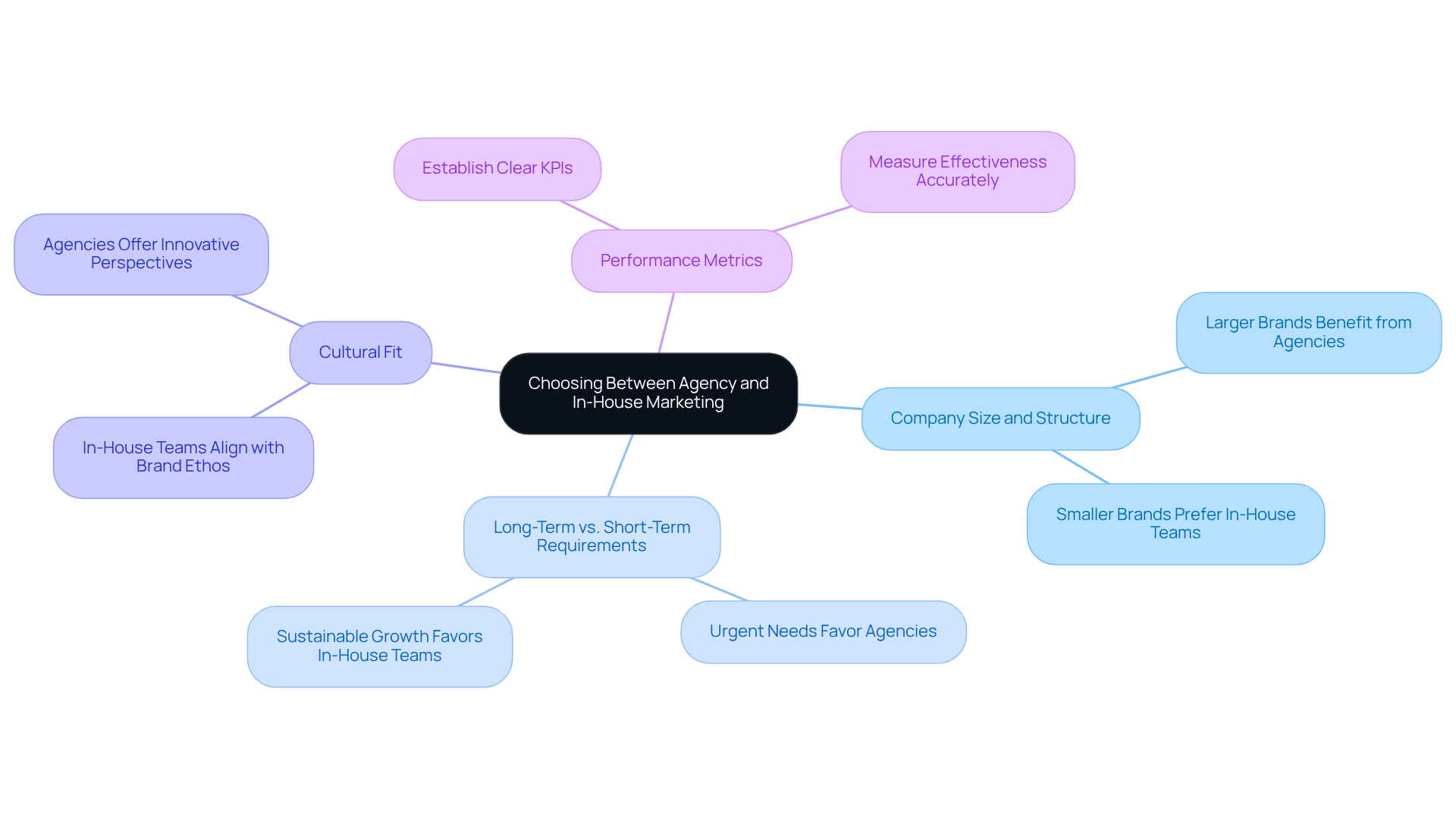
Overview
This article rigorously examines the distinctions between digital marketing advertising agencies and in-house teams, offering valuable insights for DTC brands to determine the most suitable approach for their unique needs.
Agencies are characterized by their specialized expertise and scalability, which can significantly enhance marketing efforts. Conversely, in-house teams possess profound brand knowledge and direct control, enabling brands to tailor strategies precisely.
Ultimately, the choice between these two options should reflect the brand's budget, marketing objectives, and organizational structure, empowering decision-makers to align their strategies with their overarching goals.
Introduction
The landscape of digital marketing is evolving rapidly, presenting brands with a pivotal choice: collaborate with external agencies or cultivate in-house teams. Each approach offers unique advantages and challenges, particularly for direct-to-consumer (DTC) brands striving for effective market engagement. This article delves into critical insights that can guide DTC brands in navigating the complexities of their marketing strategies. As businesses weigh their options, the pressing question remains: which path will yield the best results in a competitive digital environment?
Understanding Digital Marketing Agencies and In-House Marketing
A serves as an external firm that provides , incorporating a broad spectrum of strategies including SEO, PPC, content creation, and social media management.
These agencies typically comprise a diverse group of specialists, each contributing unique skills that facilitate a .
In contrast, involves a overseeing all promotional activities. This internal team is often more familiar with the company's culture, products, and customer base, leading to more tailored promotional efforts.
Both approaches present , which will be examined in greater detail throughout this article.

Pros and Cons of Digital Marketing Agencies vs. In-House Teams
Pros of Digital Marketing Agencies:
- : Digital marketing agencies employ specialists across various fields, offering a depth of knowledge that may be lacking in-house. This expertise enables them to implement tailored to diverse market needs.
- Scalability: Agencies provide the flexibility to scale services rapidly according to client demands, adapting seamlessly to changing market conditions. This agility is crucial in today’s fast-paced environment.
- Cost-Effectiveness: Although a may seem expensive, it often provides a superior return on investment (ROI) by utilizing its specialized skills to drive impactful results.
Cons of Digital Marketing Agencies:
- Less Brand Familiarity: Agencies might not possess an in-depth understanding of the brand's culture and values, potentially leading to misaligned marketing strategies that do not resonate with the target audience.
- Communication Challenges: Collaborating with an external group can sometimes introduce delays in communication and decision-making, which may hinder the effectiveness of marketing initiatives.
Pros of :
- Deep Brand Knowledge: In-house teams inherently understand the brand's mission, values, and customer base, allowing for more tailored and effective marketing efforts that align closely with organizational goals.
- Direct Control: Companies benefit from greater influence over their promotional strategies, enabling them to make swift adjustments as necessary to respond to market dynamics.
Cons of In-House Teams:
- Limited Expertise: In-house teams may lack the specialized skills that agencies provide, which can restrict the effectiveness of certain marketing strategies and limit innovation.
- Higher Fixed Costs: Maintaining a full-time workforce can incur higher fixed costs over time, particularly if the workload fluctuates, making it essential for companies to evaluate their resource allocation carefully.

Evaluating Suitability for DTC Brands: Agency vs. In-House
When assessing the suitability of versus in-house teams for , several critical factors must be considered:
- Budget: For DTC brands operating with limited financial resources, agencies often provide more . This is primarily because they eliminate the overhead costs associated with hiring full-time staff, allowing brands to allocate funds more strategically.
- : Brands that prioritize rapid growth and require —such as SEO and PPC—are likely to benefit significantly from the expertise offered by a digital marketing advertising agency. Conversely, companies aiming for long-term development may find greater reliability in an that is deeply integrated into the brand’s culture and objectives.
- Scalability Requirements: In situations where a DTC company anticipates fluctuating promotional demands, a digital marketing advertising agency can provide the necessary flexibility to scale services up or down as needed, without the commitment of additional personnel.
- Brand Complexity: Organizations with intricate narratives or products may derive substantial advantages from an internal group. Such teams possess the capacity to thoroughly understand and effectively communicate the brand's story, ensuring that messaging aligns seamlessly with the brand’s vision.

Key Considerations for Choosing Between Agency and In-House Marketing
When deciding between a and an in-house team, must critically evaluate several key factors:
- Company Size and Structure: Larger brands often gain significant advantages from the specialized skills offered by an agency. Conversely, smaller brands may find that that aligns closely with their goals.
- Long-Term vs. Short-Term Requirements: Brands facing of a digital marketing advertising agency. In contrast, those focused on sustainable, may discover that internal teams are more beneficial in achieving their strategic objectives.
- Cultural Fit: The alignment of marketing strategies with the brand's culture is of paramount importance. In-house teams typically offer superior alignment with the brand's ethos, while agencies can introduce innovative perspectives that challenge the status quo.
- Performance Metrics: to assess the effectiveness of either approach. This ensures that success can be measured accurately, allowing for necessary adjustments to be made in a timely manner.

Conclusion
The decision to engage a digital marketing advertising agency versus cultivating an in-house marketing team is a critical juncture for DTC brands. Each path presents unique advantages and challenges, necessitating a thorough evaluation to determine which aligns best with the brand's specific objectives and context.
In this analysis, we juxtapose the strengths of digital marketing agencies—such as their specialized expertise, scalability, and cost-effectiveness—against the merits of in-house teams, which offer deep brand knowledge and direct oversight of marketing strategies. Key considerations for DTC brands encompass:
- Budget limitations
- Marketing goals
- The intricacy of the brand's narrative
- The imperative for flexibility in scaling marketing initiatives
Ultimately, the choice is contingent upon a brand's distinct needs and long-term aspirations. By meticulously assessing the outlined factors, DTC brands can make informed decisions that not only enhance their marketing efficacy but also catalyze growth in an ever-evolving digital landscape. Adopting the appropriate marketing strategy is vital, as it profoundly impacts a brand's capacity to engage its audience and secure sustainable success.
Frequently Asked Questions
What is a digital marketing agency?
A digital marketing agency is an external firm that provides specialized services to businesses, utilizing a variety of strategies such as SEO, PPC, content creation, and social media management.
What types of specialists work at digital marketing agencies?
Digital marketing agencies typically consist of a diverse group of specialists, each bringing unique skills that contribute to a comprehensive promotional strategy.
What is in-house marketing?
In-house marketing refers to a dedicated team within a company that oversees all promotional activities, often leading to more tailored efforts due to their familiarity with the company's culture, products, and customer base.
What are the advantages of using a digital marketing agency?
Digital marketing agencies can offer specialized knowledge and a wide range of services, allowing businesses to leverage expertise that may not be available in-house.
What are the advantages of in-house marketing?
In-house marketing teams are typically more aligned with the company's culture and goals, enabling them to create more personalized and relevant promotional strategies.
What are the disadvantages of digital marketing agencies?
One potential disadvantage is that external agencies may lack a deep understanding of the company's specific needs and culture, which can affect the relevance of their strategies.
What are the disadvantages of in-house marketing?
In-house marketing may be limited by the team's skill set and resources, which can restrict the range of strategies and expertise available compared to a specialized agency.
FAQs











